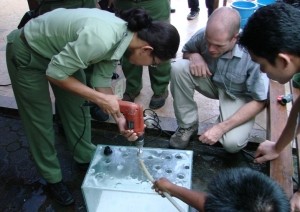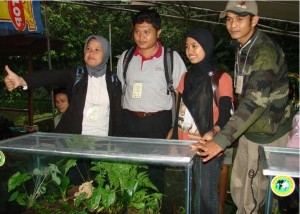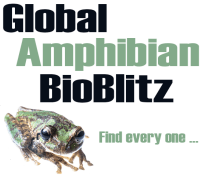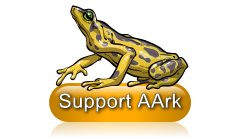Once the needs of a threatened amphibian species are assessed and there is a clear directive on where to expend precious resources within a given range country, AArk works to encourage meaningful conservation action. Too often ex situ projects are initiated in haste, without attention to the details of resources and planning. Simply collecting amphibians and placing them into captive facilities is NOT adequate conservation action. Our Ex Situ Conservation Training Workshops provide technical information and husbandry skills to partners carrying out hands-on work in caring for amphibians in captive programs. These workshops cover many specific topics including:
 Planning for captive programs
Planning for captive programs- Basic husbandry
- Water quality and lighting
- Captive reproduction techniques
- Health
- Nutrition
- Veterinary care
- Biosecurity and quarantine
AArk staff and many of our enlisted consultants from the conservation community also work to help people in range countries to develop, initiate, and maintain amphibian conservation programs through either online or on-site consultations. Since 2004, AArk staff and our partners (notably the Association of Zoos and Aquariums and Durrell Wildlife Conservation Trust) have already trained over 1,300 students in amphibian biology, husbandry, and conservation practices through forty-two courses in twenty-six countries. You can find PowerPoint presentations from these workshops on our Presentations page, and other husbandry-related documents on our Husbandry Documents page.
A short webinar series, developed in 2020 by the Amphibian Ark, provides an interactive, online forum where managers of ex situ amphibian programs can discuss some of the main challenges program managers and keepers might have as they strive to reach their conservation goals. The content of the webinars follows the key steps in establishing and maintaining a successful ex situ amphibian conservation program. Each session runs for 60 minutes.
Contact  our Training Officer, Luis Carrillo (Luis@AmphibianArk.org) for additional husbandry information, to obtain a menu of specific workshop topics, or to discuss husbandry workshops in your area. If you have skills to share, please let us know. We are always searching for additional instructors and participants.
our Training Officer, Luis Carrillo (Luis@AmphibianArk.org) for additional husbandry information, to obtain a menu of specific workshop topics, or to discuss husbandry workshops in your area. If you have skills to share, please let us know. We are always searching for additional instructors and participants.
When we take animals into captivity for any ex situ program, we become accountable for their well-being until they can be properly established back in nature. Proper planning for these programs is absolutely crucial to their success and the future of these species. To address this particularly important aspect, we have developed a program implementation tool – more information on the tool and links to it can be found on the Adequate Resources page. See the Establishing Ex Situ Amphibian Programs page for additional information on implementing amphibian conservation programs.
Our partners at the Durrell Wildlife Conservation Trust run a five-day intensive Amphibian Conservation Husbandry course at their headquarters in Jersey, designed to expose participants to the latest theory and practice of amphibian husbandry. Participants will be equipped to establish and manage captive populations and breeding programs for some of the world’s most threatened amphibians.













